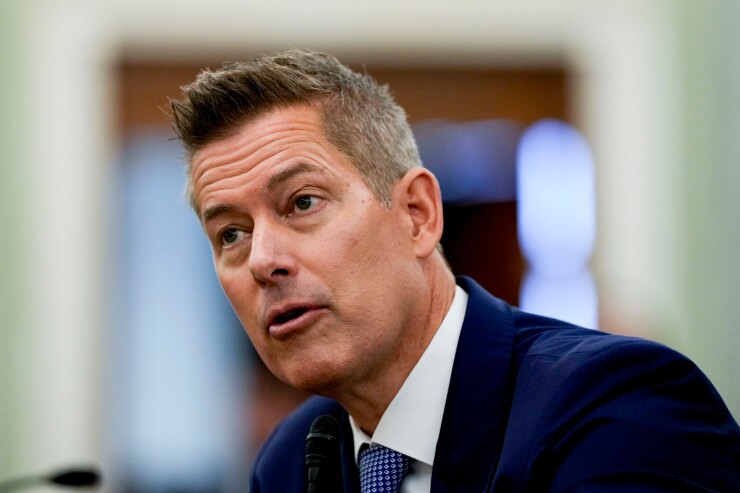Kent Nishimura/Bloomberg
President-elect Donald Trump’s pick for transportation secretary, former Congressman and Fox News host Sean Duffy, pledged to trim red tape and keep federal funds flowing for big infrastructure projects during a Senate confirmation hearing Wednesday.
“I don’t think safety is a partisan issue,” Duffy told the Senate Commerce, Science and Transportation Committee, during what was its first meeting under Republican leadership of chair Sen. Ted Cruz, R-Texas.
“The projects . . . that we talk about today, those aren’t partisan projects. Infrastructure is nonpartisan,” Duffy said. “I’m committed to working in a bipartisan fashion to make sure we are looking at the best projects with the safest record.”
Duffy faced little opposition from lawmakers who praised him for his reputation for bipartisanship during his years in the House.
If confirmed, Duffy would take the helm of a department that has grown substantially under the Biden administration as it stood up dozens of new programs as part of the five-year, $1.2 trillion Infrastructure Investment and Jobs Act. Its budget totals roughly $146.2 billion, including advance IIJA appropriations.
Duffy, 53, was in Congress for nine years before resigning in 2019, and until November was the host of The Bottom Line on Fox Business. Duffy was the lead sponsor of the Puerto Rico Oversight, Management and Economic Stability Act in 2016 to restructure the territory’s debt. After leaving Congress, he was a senior counsel at lobbying firm BGR Group, where he focused on banking, housing, transportation and capital markets, according to the firm.
Duffy said if confirmed he would work “to reduce the red tape that slows critical infrastructure projects,” and called the National Environmental Policy Act process “complicated and time-consuming.” He said he would work to help Trump build “the big infrastructure projects that connect this country without forgetting, by the way, rural America that uses that incredibly important infrastructure.”
The Trump administration is expected to push for permitting reform, and the U.S. Supreme Court is currently
Cruz raised the topic of federal funds for California’s high-speed rail project,
“It currently has an unfunded gap of roughly $100 billion. And yet, the Biden administration doubled down by awarding more than $4 billion in taxpayer dollars to this ill-fated project,” Cruz said. “If confirmed, do you commit to sharing with this committee the DOT staff ratings for all applications of discretionary funding over the last four years in which the California High Speed Rail project received an award?”
“Yes senator, I believe in transparency and so I would commit to sharing those ratings with the committee,” Duffy said.
New Jersey Democrat Sen. Andy Kim asked Duffy if he would keep federal funds flowing for
“I appreciate in our conversation you brought up the Gateway, among other things,” Duffy responded. “And again, I want to look at what funding has gone out. But I imagine those good projects that are underway we would continue.”
Duffy also pledged to work with the committee on the next surface transportation funding act, which Congress will begin crafting this year ahead of the 2026 expiration of current funding.
He outlined three scenarios to increasing the long-struggling Highway Trust Fund: a federal gas tax increase, which he said he would not support; an increase in tolling; and a per-mile road usage fee. He also told the committee that electric vehicles “should pay for use of our roads” by contributing to the fund.
“We could also be far more efficient with our dollars, streamline our approach and get dollars into our projects faster — that could go a long way to shoring up the trust fund,” he said.
The need to streamline project delivery and require EVs to pay into the trust fund were also topics that popped up Wednesday during the House Transportation and Infrastructure Committee’s first hearing of the 119th Congress titled “America Builds: The State of the Nation’s Transportation System.”
The hearing was the first of many the committee will hold as it begins to craft the next surface transportation bill.
The hearing offered a preview of the likely coming debate over whether federal funds should be structured as formula funds sent directly to the states or continue the Biden administration’s emphasis on competitive grant funding.
“Formula funding allows states to plan and execute projects efficiently. In contrast, discretionary grants require a lengthy process — notice of funding opportunity, application process, DOT review process, project awards etc. — which unnecessarily delay projects breaking ground,” said Seth Schulgen, who testified on behalf of the Associated General Contractors of America.
“Money that could have been spent investing in infrastructure was spent chasing after discretionary funds run out of Washington. Instead, providing states more funding and flexibility, through the formulas, to determine how best to spend federal funds within their communities would be a more efficient way to maximize infrastructure investments.”
